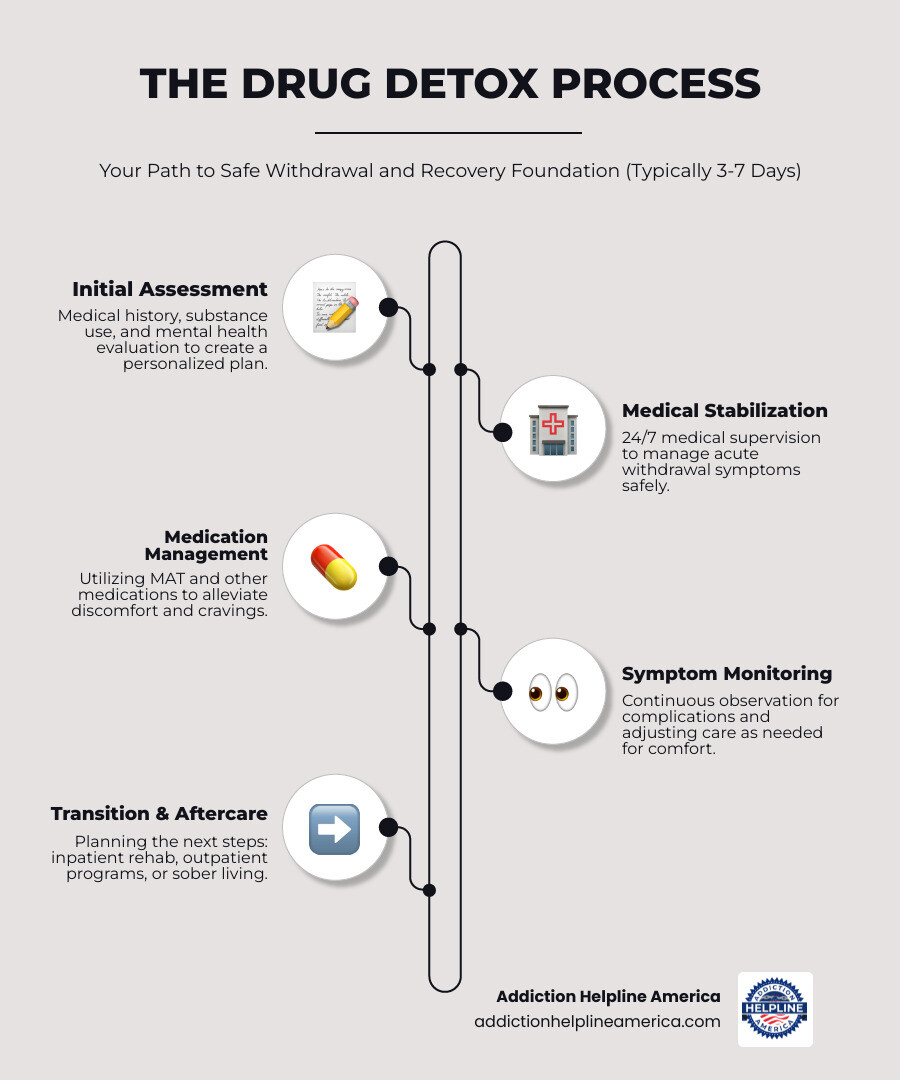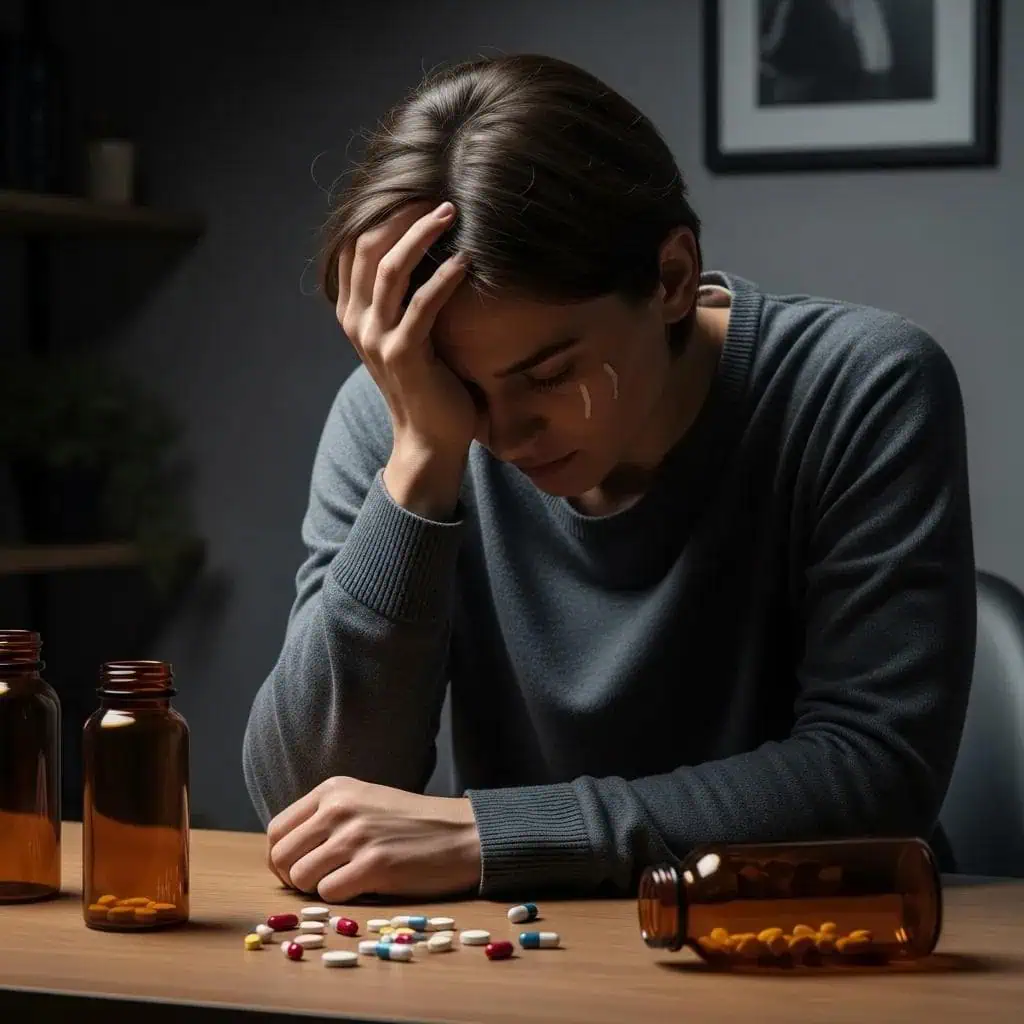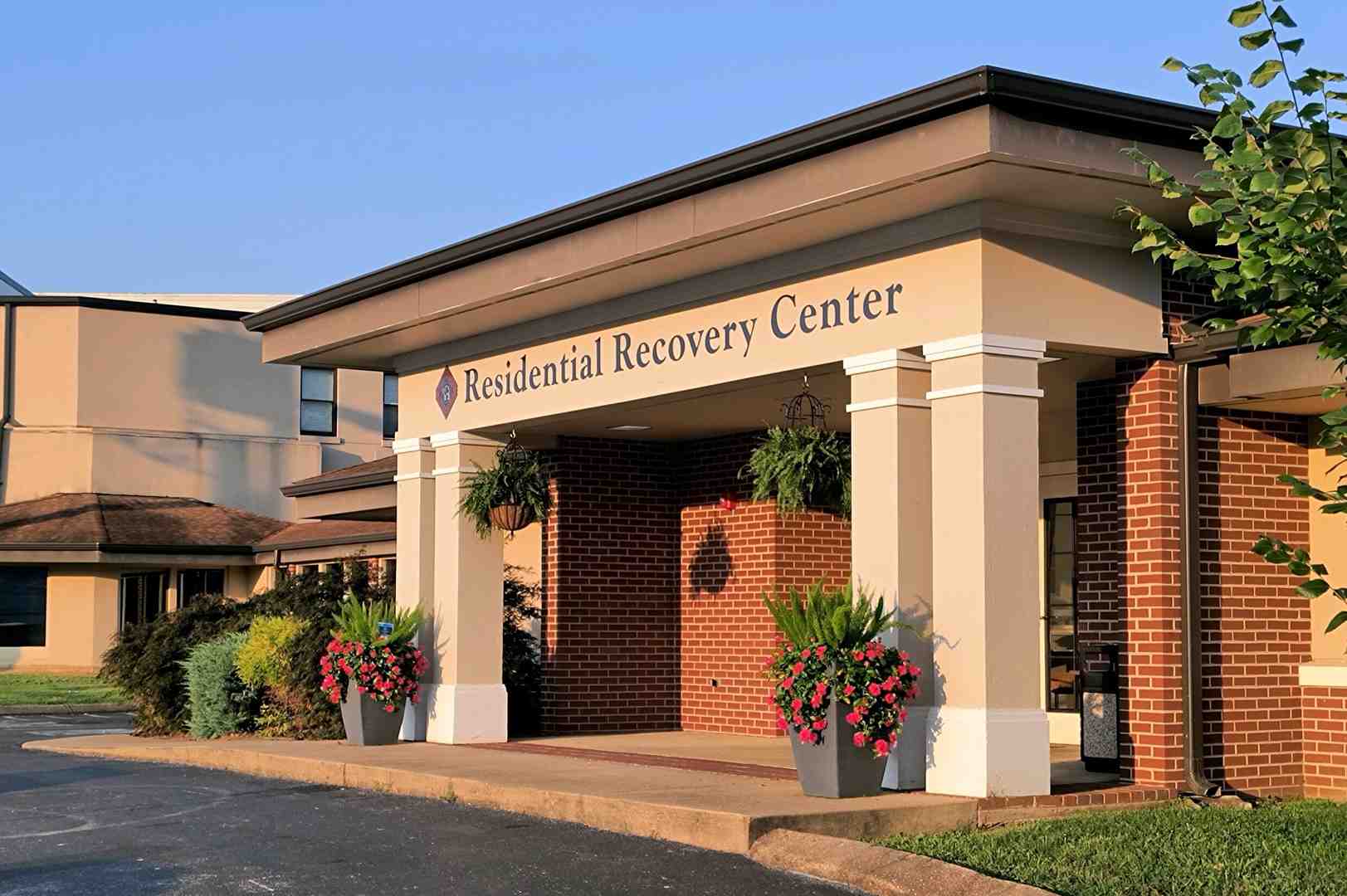
Why Professional Detox is the Crucial First Step
Drug detox Massachusetts programs offer medically supervised withdrawal management, helping individuals safely clear harmful substances from their bodies. Understanding that detox is a medical necessity—not a matter of willpower—is the first step.
Key Facts About Drug Detox in Massachusetts:
- Duration: Typically 3-7 days, but can be up to 2 weeks.
- Types: Inpatient (24/7 care) and Outpatient (flexible scheduling).
- Medical Support: Includes medication-assisted treatment (MAT), nursing care, and physician oversight.
- Cost: Often covered by MassHealth, Medicare, and private insurance.
- Next Steps: Detox is followed by inpatient rehab, outpatient programs, or sober living.
Quitting substances “cold turkey” is dangerous and can be life-threatening, especially with alcohol, opioids, and benzodiazepines. Withdrawal symptoms vary but often include severe nausea, seizures, extreme anxiety, and dangerous changes in heart rate and blood pressure.
Professional detox centers in Massachusetts provide the 24/7 medical supervision needed to manage these symptoms safely, allowing individuals to stabilize without fear of medical complications. The need is urgent; in 2021, Massachusetts saw an estimated 2,031 fatal opioid-involved overdoses, highlighting the need for accessible treatment.
At Addiction Helpline America, we connect people with trusted drug detox Massachusetts facilities offering compassionate, evidence-based care. Our team provides free, confidential guidance 24/7 to help you take that crucial first step toward recovery.

Drug detox Massachusetts vocab to learn:
Understanding the Different Types of Drug Detox Programs in Massachusetts
Every drug detox Massachusetts program aims to help you safely withdraw from substances and prepare for recovery. This process is medically monitored, meaning a team of physicians, nurses, and counselors provides 24/7 nursing care. This constant support is a lifeline, as withdrawal can be unpredictable. Having professionals monitor vital signs and respond to complications makes detox safe.
A key tool is Medication-Assisted Treatment (MAT), which combines FDA-approved medications with therapy to manage cravings and emotional distress. For opioid dependence, medications like buprenorphine (Suboxone), naltrexone, and methadone ease discomfort and reduce relapse risk. For alcohol withdrawal, specific medications prevent dangerous symptoms like seizures. This isn’t replacing one drug with another; it’s providing a safer path to recovery.
Most detox programs last 3 to 7 days, but the timeline is personalized. Depending on the substance used, duration of use, and overall health, it could extend to two weeks.
Inpatient vs. Outpatient Detox
Choosing between inpatient and outpatient detox depends on your specific needs.
Inpatient (or residential) detox provides 24/7 care in a structured facility. It’s the best choice for severe addiction, complex withdrawal histories, or co-occurring mental health disorders. The immersive environment removes you from daily triggers, allowing you to focus completely on stabilization within a supportive therapeutic community.
Outpatient detox offers flexibility, allowing you to live at home while attending the facility for medical check-ups and monitoring. This model works for those with mild to moderate withdrawal symptoms and a stable, supportive home life.
Here’s how they compare:
| Feature | Inpatient Detox | Outpatient Detox |
|---|---|---|
| Environment | 24/7 supervised, residential setting | Attend daily sessions, return home at night |
| Medical Care | Continuous medical monitoring, immediate intervention | Scheduled medical check-ups, medication management |
| Support Level | High, structured, therapeutic community | Moderate, requires strong home support |
| Ideal for | Severe addiction, high relapse risk, co-occurring disorders | Mild to moderate addiction, stable home environment |
| Flexibility | Low, full-time commitment | High, allows for work/family obligations |
| Cost | Generally higher, but often covered by insurance | Generally lower, often covered by insurance |
Common Withdrawal Symptoms and Management
Knowing what to expect can make withdrawal less frightening. Medical professionals are trained to manage these symptoms.
Opioid withdrawal often includes intense muscle aches, nausea, vomiting, and severe anxiety. While not typically life-threatening, the pain often leads to relapse. Medications like buprenorphine ease these symptoms significantly.
Alcohol withdrawal can be dangerous. Symptoms can escalate from tremors and anxiety to hallucinations, seizures, or a fatal condition called delirium tremens (DTs). Medically supervised detox is critical to prevent these severe outcomes.
Benzodiazepine withdrawal carries similar risks to alcohol, including life-threatening seizures. A medical team will create a gradual tapering schedule to minimize symptoms and ensure safety.
Stimulant withdrawal (from cocaine, meth, etc.) is not usually medically dangerous but can cause severe depression, fatigue, and intense cravings. Management focuses on supportive care to address these psychological symptoms.
In drug detox Massachusetts centers, medical treatment is often combined with holistic comfort measures like yoga, meditation, or fitness programs to support your overall well-being during this challenging phase.
At Addiction Helpline America, we connect you with facilities that provide this kind of individualized, compassionate attention.
How to Choose the Right Drug Detox Massachusetts Center for You

Choosing a drug detox Massachusetts center is a critical decision that requires a personalized approach. You’re not just looking for a facility, but a team that will listen to your story and create a customized path forward. At Addiction Helpline America, our mission is to connect you with centers that treat you as an individual.
Essential Qualities of a Top-Tier Drug Detox in Massachusetts
When evaluating centers, look for these indicators of quality and safety:
Accreditation and Licensing: Top facilities hold accreditation from The Joint Commission (JCAHO) or CARF, demonstrating they meet strict national standards for safety and quality. Crucially, they must also be licensed by the MA Bureau of Substance Addiction Services (BSAS), ensuring they comply with state-specific regulations.
Individualized Treatment Plans: A quality program begins with a comprehensive assessment of your addiction history, health, and personal goals. This information is used to create a treatment plan custom specifically to you.
Evidence-Based Therapies: The best programs use therapies backed by research, such as Cognitive Behavioral Therapy (CBT), which provides tools to change unhealthy patterns, and Dialectical Behavior Therapy (DBT), which teaches skills for managing intense emotions.
Dual Diagnosis Treatment: Addiction often co-occurs with mental health conditions like depression or anxiety. A facility equipped to treat both simultaneously provides a much stronger foundation for lasting recovery.
Navigating Costs, Insurance, and Payment Options
Affordable, quality care is more accessible than many realize. Most reputable drug detox Massachusetts centers are in-network providers with major private insurance carriers like Blue Cross Blue Shield, Tufts Health Plan, and Cigna, which helps lower out-of-pocket costs.
Public insurance options are also widely accepted. Massachusetts Medicaid (MassHealth) and Medicare provide pathways to care for those with limited income, older adults, and individuals with certain disabilities, removing financial barriers to treatment.
If you don’t have insurance, you still have options. Many centers offer sliding scale fees based on income or provide financing options and payment plans. Our partner facilities can often perform a rapid insurance verification to clarify your coverage and costs upfront.
At Addiction Helpline America, we guide you through these financial questions, connecting you with centers that fit both your treatment needs and your budget. Recovery shouldn’t be out of reach because of money.
Life After Detox: Building a Foundation for Lasting Recovery
Completing detox is a courageous first step, but it’s the beginning of the journey, not the destination. Detox clears the way for the real work of recovery: understanding the roots of addiction and building skills for a substance-free future. A continuum of care is vital for success.
After drug detox Massachusetts, you’ll learn concrete relapse prevention strategies, such as identifying triggers and practicing healthy coping mechanisms. Building a strong support network of family, peers, and support groups is equally important. Recovery thrives in community.
The Next Steps in the Addiction Treatment Process
Your treatment team will help you plan your next phase of recovery. Common options include:
Inpatient Rehab: A residential program providing a safe, structured environment for intensive therapy. It’s ideal for those with severe addiction or co-occurring disorders, as it removes you from daily triggers.
Outpatient Programs (PHP & IOP): A Partial Hospitalization Program (PHP) offers daily treatment, while an Intensive Outpatient Program (IOP) involves therapy several times a week. These allow you to maintain work or family duties while receiving substantial support.
Sober Living Homes: These are structured, substance-free residences where people in early recovery live together, offering peer support and accountability.
Before leaving a program, you’ll create a comprehensive aftercare plan—a roadmap for maintaining recovery through ongoing therapy, support groups, and community resources. For more on the rehabilitation process, you can explore more info about drug rehabilitation.
At Addiction Helpline America, we guide you through the full continuum of care, ensuring you have the right support at every stage.
How Families Can Support a Loved One in Recovery

Addiction impacts the entire family, and healing should too. Many treatment centers offer resources to help families recover together.
Family therapy programs provide a guided space to rebuild trust and improve communication. Educational workshops teach families about the science of addiction, helping them understand it as a disease, not a moral failing. Support groups like Al-Anon and Nar-Anon offer a community of people with shared experiences, reducing feelings of isolation.
Learning to set healthy boundaries is also crucial. This means being clear about what you will and won’t accept to protect your well-being while encouraging your loved one’s recovery. It’s not about punishment, but about creating an environment where sobriety can flourish.
When families engage in the recovery process, they become powerful allies. At Addiction Helpline America, we connect you with drug detox Massachusetts programs that involve families in the healing process.
Frequently Asked Questions About Drug Detox in Massachusetts
It’s natural to have questions when considering drug detox Massachusetts programs. Here are answers to some of the most common ones.
How long does the drug detox process typically last?
The timeline for detox is unique to each person, depending on the substance used, duration of use, physical health, and any co-occurring mental health conditions. However, most medically supervised drug detox Massachusetts programs last 3 to 7 days. For severe dependence or long-term benzodiazepine use, detox may extend to two weeks or more. The medical team’s goal is to ensure a safe and comfortable withdrawal, never rushing the process.
What happens after I complete a detox program?
Detox is the first step, not the last. After detox, you transition into ongoing addiction treatment to build a foundation for lasting recovery. This is known as the continuum of care. Based on your needs, your care team will help you create an aftercare plan that may include:
- Inpatient residential rehab for intensive, structured care.
- Outpatient programs (PHP or IOP) for flexible yet comprehensive support.
- Sober living homes for a supportive, substance-free living environment.
- Ongoing therapy and participation in support groups like AA or NA.
Are there specific regulations for detox centers in Massachusetts?
Yes, regulations exist to ensure patient safety and quality of care. All detox centers in the state must be licensed by the Massachusetts Bureau of Substance Addiction Services (BSAS). This state agency sets and enforces standards for staffing, treatment protocols, and patient rights.
Many top-tier facilities also pursue voluntary national accreditation from organizations like The Joint Commission or CARF. These credentials signify a commitment to meeting the highest national benchmarks for healthcare quality and safety, going beyond the minimum state requirements. At Addiction Helpline America, we only partner with facilities that meet these rigorous standards.
Your Path to Recovery Starts Today
If you’ve read this far, you’re already taking a courageous step. We want you to know that recovery is truly possible. We’ve seen it happen for thousands of people who felt just as uncertain as you might feel today.
Taking that first step—reaching out for help—is often the hardest part. You don’t have to have all the answers or a perfect plan. You just have to be willing to ask for guidance.
Finding the right help is critical, and that’s where we come in. At Addiction Helpline America, we have relationships with quality treatment facilities throughout Massachusetts and across the country. We know which centers specialize in dual diagnosis, accept your insurance, or offer the environment that’s right for you.
Our service is completely free and confidential. We offer personalized recommendations based on your unique situation, with no judgment or pressure. Whether you’re calling for yourself or a loved one, we’re here to listen and help you steer your options.
The future you hope for is within reach. People across Massachusetts are living that reality because they made the decision to get help. You can be one of them.
Your path to recovery starts today. Let us walk alongside you as you take that crucial first step.
Find a rehab center in our network
Our helpline is 100%
free & confidential
If you or someone you care about is struggling with drug or alcohol addiction, we can help you explore your recovery options. Don’t face this challenge alone—seek support from us.
Programs
Resources
Will my insurance
cover addiction
treatment?
We're ready to help
Find the best
drug or alcohol treatment
center
Are you or a loved one struggling with addiction? Call today to speak to a treatment expert.











